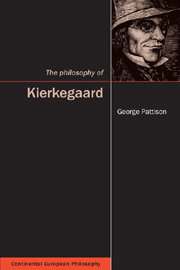Book contents
- Frontmatter
- Contents
- Dedication
- Acknowledgements
- Abbreviations and forms of reference
- Dedication
- Introduction: Kierkegaard and philosophy
- 1 Existence
- 2 Anxiety
- 3 The good
- 4 The infinite qualitative difference and the absolute paradox
- Epilogue: The Christian witness and the simple wise man of ancient times
- Notes
- Guide to further reading
- Index
4 - The infinite qualitative difference and the absolute paradox
- Frontmatter
- Contents
- Dedication
- Acknowledgements
- Abbreviations and forms of reference
- Dedication
- Introduction: Kierkegaard and philosophy
- 1 Existence
- 2 Anxiety
- 3 The good
- 4 The infinite qualitative difference and the absolute paradox
- Epilogue: The Christian witness and the simple wise man of ancient times
- Notes
- Guide to further reading
- Index
Summary
The problem
The religious dimension of Kierkegaard's thought has now been touched on a number of times. Of course (and as I noted in the Introduction), the mere fact that a thinker is also religious or occupies himself at a number of points in his writings with religious questions does not immediately disqualify him from counting as a philosopher. But just as the communist poet V. V. Mayakovsky promulgated artistic principles concerning the subordination of art to the Communist Party that proved self-destructive for his own career as a poet in Soviet Russia, so too a thinker like Kierkegaard might seem to have espoused particular theologically motivated principles that must be intellectually suicidal for anyone wishing to be taken seriously as a philosophical thinker. Whatever Kierkegaard himself may have thought or wished concerning this, it must constitute a stumbling-block for those who want to take him seriously as someone with something important to say in our contemporary philosophical situation.
What, then, is the problem? It can be indicated in a preliminary way by reference to the two theological “slogans” to which the title of this chapter alludes: the infinite qualitative difference and the absolute paradox. These should not be conflated, since the former might be understood in a sense that would be acceptable to believers in such non-Christian theistic traditions as Judaism and Islam, concerning as it does the general relationship between God and the world.
Information
- Type
- Chapter
- Information
- The Philosophy of Kierkegaard , pp. 133 - 171Publisher: Acumen PublishingPrint publication year: 2005
